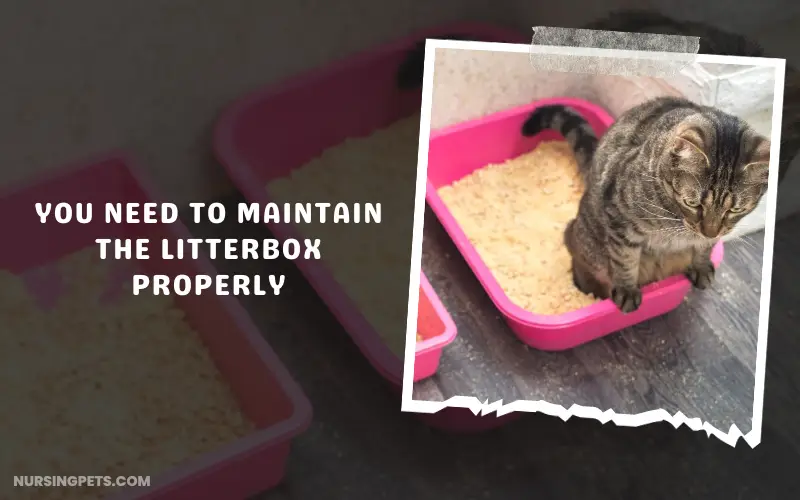Can Cat Pee Make You Sick? (Cat Owners Beware)
Cleaning up cat urine is never a pleasant task, and it’s not just the odor that concerns us. Cleaning the area quickly after contact with cat urine usually resolves the problem. But in certain conditions, cat pee also can be harmful to individuals. Many cat owners have gotten sick from cat urine.
Now, can cat pee make you sick? Indeed, it can. Cat urine contains bacteria and toxins. Both can lead to respiratory and stomach issues also skin infections. It may also trigger severe conditions like meningitis and sepsis. Inhaling excess ammonia in cat urine can affect your respiratory system, which causes coughing and eye discomfort.
Today, we’re going to talk about why cat pee makes you sick and what to do when you get sick, and we’ll explore all aspects of this topic.

Here is another related article you would be interested in: What Gets Rid of Cat Pee Smell?
Is Cat Urine Harmful to Humans?
Do you know that breathing in cat urine fumes is dangerous? Respirations in it can be harmful due to the ammonia content. Cat urine is a complex mixture of biological waste. It primarily consists of water, urea, creatinine, and ammonia.
Small quantities aren’t typically harmful to humans. However, the presence of ammonia is what raises concerns.

When cat urine decomposes, High levels of ammonia fumes in the air can irritate the respiratory tract, leading to symptoms like coughing, wheezing, and eye displeasure. Prolonged exposure can exacerbate respiratory conditions and may be particularly concerning for individuals with asthma or allergies.
Health Risks Associated with Cat Urine
Exposure to cat urine can indeed pose certain health risks. Do you know what diseases you can get from cat urine? Here are some of the health concerns associated with cat urine:
1. Allergies
Cat urine can pose an allergen threat, mainly due to a protein known as Fel d 1. Dried airborne urine particles can induce allergic reactions in sensitive people. These allergic responses often manifest as sneezing, a runny or congested nose, itchy eyes, and skin rashes.

2. Asthma
Cat urine doesn’t directly cause asthma, but it can exacerbate asthma symptoms in individuals who are already sensitive or allergic to it. The ammonia and allergens in cat urine can trigger asthma attacks or worsen asthma symptoms in susceptible individuals.
3. Urinary Tract Infections
Frequent exposure to cat urine can raise the chance of UTIs due to bacteria. But good hygiene helps lower the risk. UTI symptoms include frequent urination, burning, and discomfort. Stay clean to stay healthy.
4. Toxoplasmosis
Toxoplasmosis is primarily associated with cat feces (not urine). It can be contracted from handling cat litter contaminated with Toxoplasma gondii oocysts, but the risk from cat urine is minimal.

Pregnant women and individuals with weakened immune systems should still take precautions when dealing with cat waste.
5. Zoonotic Diseases
Cat urine can transmit zoonotic diseases from animals to humans. However, direct transmission through urine is rare. Good hygiene practices can reduce the risk of contracting diseases like leptospirosis or Bartonella infection.
6. Bacterial Contamination
Cat urine can harbor bacteria, especially if left to sit in a warm and humid environment. This can potentially lead to bacterial contamination of the surrounding area.
Individuals Who Are More Vulnerable to Risks of Cat Urine
Certain individuals are more vulnerable to the health risks associated with cat urine exposure. Below, we discuss a list of different groups and how they can be affected by it:
People With Respiratory Conditions
Individuals with pre-existing respiratory conditions like asthma or chronic obstructive pulmonary disease (COPD) are more susceptible to the respiratory irritants present in cat urine. Exposure can exacerbate their symptoms and lead to breathing difficulties.
Children
Keep your children away from the cat litter box or the places where your cat can usually urinate. Because you already know cat urine is toxic, and going near it can make your toddler sick. So, as a family person, keep an eye on your baby.

Pregnant Women
Pregnant women should be cautious with cat litter due to toxoplasmosis risk. It’s in cat feces, not urine. Contact with contaminated litter can harm the fetus, so use gloves and hygiene precautions.
Immunocompromised Individuals
Cat urine exposure affects elderly individuals. Due to medical conditions or medications, immunocompromised individuals, or those with weakened immune systems, are more susceptible to infections that are transmitted through cat urine.
When to Seek Medical Attention?
Knowing when to seek medical attention after exposure to cat urine is vital. Go to the doctor immediately whenever you see the following problems:

- Respiratory Issues: Ongoing coughing, wheezing, shortness of breath, or chest tightness.
- Skin Problems: Continual rashes, itching, or hives. Some individuals can experience severe allergic reactions to cat urine.
- Eye Irritation: Sustained redness, itching, swelling, or excessive tearing of the eyes.
- Nasal Congestion: Prolonged or worsening nasal congestion, sneezing, or a runny nose.
- Urinary Tract Infections (UTIs): If you suspect a UTI, like through a scratch or wound contaminated with urine.
- Vomiting: In more extreme cases, exposure to cat urine odor can induce vomiting. This response is more likely in individuals with heightened sensitivity or allergies to pet dander or urine.

- Anaphylaxis: Anaphylactic shock is a severe, life-threatening allergic reaction. Symptoms may include a rapid heartbeat, severe swelling, difficulty swallowing, and a drop in blood pressure.
- Fever: Fever is directly not caused by cat urine itself. Exposure to certain components in cat urine can lead to health issues Like Allergies, Infection, Toxoplasmosis, and Cat Scratch disease. These infections can cause fever.
Knowing when to seek medical attention after exposure to cat urine is vital. You should consider it in the following situations.
How to Prevent Health Issues From Cat Urine
You already have an idea about how you can be affected by cat urine. Remember to maintain a clean and safe environment when dealing with it. In this way, health issues can be prevented for both of you.

Here are some tips on the proper way to disinfect surfaces contaminated with cat urine:
Proper Litter Box Maintenance: Ensuring your cat’s litter box is clean and changed regularly is crucial. Cats are more likely to urinate outside the box if it’s dirty or if they have a medical issue, so keep it clean.
Adequate Ventilation: Good airflow is essential when dealing with cat urine odors. Open windows and use fans to help dissipate the smell. Proper ventilation can also help prevent the buildup of harmful fumes.
Regular Cleaning Routines: Develop a routine for cleaning areas soiled by cat urine. The sooner you clean, the better. Fresh stains are easier to remove and less likely to leave lasting odors.
Using Appropriate Cleaning Products: Choose cleaning products designed specifically for pet urine cleanup. Avoid ammonia-based cleaners because they can mimic the smell of cat urine and might encourage your cat to re-mark the area.
“You can check this product from Amazon for cleaning cat urine and odor.”
Instead, opt for enzymatic cleaners (the link will take you to Amazon) that effectively break down the uric acid in cat urine.

Proper Hygiene Practices: Wear gloves and use disposable or washable cleaning clothes when cleaning cat urine. Wash your hands thoroughly after handling soiled materials. Avoid touching your face during cleanup to prevent potential contamination.
Visit a Doctor: If you’re feeling unwell or have some discomfort after cleaning the cat’s urine or the litterbox, you better visit a doctor and get checked for unwanted conditions.
Frequently Ask Questions
1. Can Cat Urine Lead to Skin Irritation or Rashes?
Cat urine can potentially cause skin irritation or rashes. As mentioned, it contains ammonia, which can irritate the skin, leading to redness, itching, or rashes, especially in sensitive individuals.
2. Can Cat Urine Kill You?
Cat urine is not lethal to humans. Still, it can emit ammonia fumes that, if inhaled in high concentrations over time, may lead to respiratory irritation or exacerbate existing health problems.
3. What Are the Side Effects of Breathing Cat Urine Ammonia?
Breathing cat urine ammonia can have several side effects. It causes eye, nose, and throat irritation, coughing, and difficulty breathing. Sustained contact may lead to more severe respiratory problems, headaches, and nausea.
4. What Would Happen If You Accidentally Drank a Drip of Cat Urine?
Accidentally ingesting a small amount of cat urine is unlikely to cause immediate harm. However, it may lead to stomach discomfort. You need to drink plenty of fresh water and beware of any signs of illness.
Final Thoughts
Now you know that cat urine usually doesn’t make people sick. But it has the ability to do so for some individuals. We believe in responsible cat ownership and practicing good hygiene for both humans and their beloved feline friends.
If you have any health concerns or experience symptoms, it’s important to consult a medical professional to prioritize your safety.
References:
- https://www.healthline.com/health/asthma/cats-and-asthma
- https://www.medicalnewstoday.com/articles/321120

